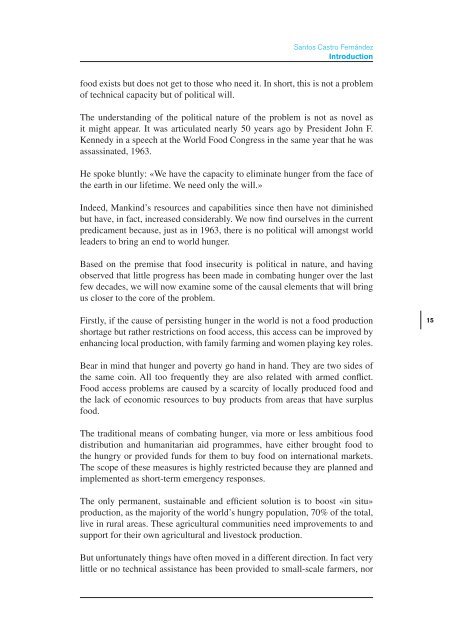Food security and global security - IEEE
Food security and global security - IEEE
Food security and global security - IEEE
- No tags were found...
Create successful ePaper yourself
Turn your PDF publications into a flip-book with our unique Google optimized e-Paper software.
Santos Castro FernándezIntroductionfood exists but does not get to those who need it. In short, this is not a problemof technical capacity but of political will.The underst<strong>and</strong>ing of the political nature of the problem is not as novel asit might appear. It was articulated nearly 50 years ago by President John F.Kennedy in a speech at the World <strong>Food</strong> Congress in the same year that he wasassassinated, 1963.He spoke bluntly: «We have the capacity to eliminate hunger from the face ofthe earth in our lifetime. We need only the will.»Indeed, Mankind’s resources <strong>and</strong> capabilities since then have not diminishedbut have, in fact, increased considerably. We now find ourselves in the currentpredicament because, just as in 1963, there is no political will amongst worldleaders to bring an end to world hunger.Based on the premise that food in<strong>security</strong> is political in nature, <strong>and</strong> havingobserved that little progress has been made in combating hunger over the lastfew decades, we will now examine some of the causal elements that will bringus closer to the core of the problem.Firstly, if the cause of persisting hunger in the world is not a food productionshortage but rather restrictions on food access, this access can be improved byenhancing local production, with family farming <strong>and</strong> women playing key roles.15Bear in mind that hunger <strong>and</strong> poverty go h<strong>and</strong> in h<strong>and</strong>. They are two sides ofthe same coin. All too frequently they are also related with armed conflict.<strong>Food</strong> access problems are caused by a scarcity of locally produced food <strong>and</strong>the lack of economic resources to buy products from areas that have surplusfood.The traditional means of combating hunger, via more or less ambitious fooddistribution <strong>and</strong> humanitarian aid programmes, have either brought food tothe hungry or provided funds for them to buy food on international markets.The scope of these measures is highly restricted because they are planned <strong>and</strong>implemented as short-term emergency responses.The only permanent, sustainable <strong>and</strong> efficient solution is to boost «in situ»production, as the majority of the world’s hungry population, 70% of the total,live in rural areas. These agricultural communities need improvements to <strong>and</strong>support for their own agricultural <strong>and</strong> livestock production.But unfortunately things have often moved in a different direction. In fact verylittle or no technical assistance has been provided to small-scale farmers, nor
















